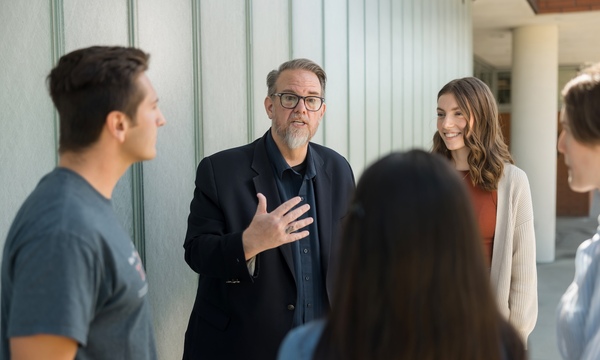In the world of science there is no more prestigious institution than Cambridge University’s Cavendish Laboratory, home to more than two centuries of Nobel Prize-winning research, including the discovery of the structure of DNA. Inscribed over its entrance are these words: "The works of the Lord are great, sought out by all of them that have pleasure therein”—Psalm 111:2 (KJV).
The verse (in Latin) was carved in oak over the original entrance when the laboratory was established in 1874 by Cavendish Professor of Physics, James Clerk Maxwell (1831-1879). Maxwell was known for numerous achievements in mathematical physics, including formulating the classical theory of electromagnetic radiation. He was also a committed follower of Jesus. When the Laboratory moved to its present site 100 years later, the inaugural verse again received star billing, now in English.
If we’re shocked at eminent scientists citing Scripture as the ground and inspiration of their work, it’s because we’ve lost sight of how important biblical ideas were to the foundations of Western intellectual life, including the origins of modern science in Europe. Prominent early scientist, Johannes Kepler, for example, spoke for many of his time when he described his work as “thinking God’s thoughts after him.”
We’ve forgotten our own history. As a result, we don’t fully understand the present and our role in it.
To forget our story is to forget who we are and why we’re here.
No wonder remembering is such a central theme in Scripture. God knows the gravitational pull of human awareness, which draws us inexorably toward forgetting. God’s people are always in danger of losing their memory, forgetting who they are and whose they are.
Crossing the Jordan
The book of Deuteronomy records Moses’s final address to the people he’s led for decades. They’re about to cross the Jordan and occupy the Promised Land—now without Moses’ stable presence and leadership. No doubt he chooses his parting words very carefully. One theme dominates throughout: Remember!
Remember not to forget.
Don’t forget to remember.
Remember to remember.
“Only be careful,” Moses warns, “and watch yourselves closely so that you do not forget the things your eyes have seen or let them fade from your heart as long as you live. Teach them to your children and to their children after them.” (4:9, my emphasis throughout) Moses anticipates that success will pose a particular temptation.
When you have eaten and are satisfied, praise the Lord your God for the good land he has given you. Be careful that you do not forget the LORD your God, failing to observe his commands, his laws and his decrees that I am giving you this day. Otherwise, when you eat and are satisfied, when you build fine houses and settle down, and when your herds and flocks grow large and your silver and gold increase and all you have is multiplied, then your heart will become proud and you will forget the LORD your God, who brought you out of Egypt, out of the land of slavery... You may say to yourself, ‘My power and the strength of my hands have produced this wealth for me.’ But remember the LORD your God, for it is he who gives you the ability to produce wealth, and so confirms his covenant, which he swore to your ancestors, as it is today.” (8:10-14, 17-18)
God’s people’s biggest danger is forgetting their story—who they are and whose they are.
Practices of memory
So how can they remember to remember?
Moses provides his people with what we may call practices of memory—intentional, deliberate patterns of behavior that remind them of their story. Building these activities into the rhythms of their life gives them ongoing, regular opportunities to stop and remember. Moses makes the memory connection explicit as he charges them to teach their children (4:9), proclaim their faith (6:4-9), observe the Sabbath (5:12-15), give thanks for their blessings (8:10), confess their sins (9:4-7), celebrate the Passover (16:1-3), tithe (26:1-11), and act with justice and compassion toward employees (15:12-15), immigrants and orphans (24:17-18), and the poor (24:19-22).
Doing these things reminds them of their story.
What exactly are they to remember?
We’ve seen one common theme: Remember the LORD your God. Another theme looms large as well: Remember what God has done for you. “Remember that you were slaves in Egypt and that the LORD your God brought you out of there with a mighty hand and an outstretched arm (5:15. See also 6:21; 15:15; 16:12; 24:17, 22).”
Remember who you are and whose you are. Your story.
Remembering our story
These are the very things we need to remember as God’s people today. Like our ancestors, we need to do so intentionally, deliberately and regularly. But how do we do this?
Organizing our lives around regular practices of memory is still profoundly helpful. Liturgical Christian traditions follow the Old Testament model of a church calendar built around key milestones in the gospel story, such as Advent, Lent, and Passion Week. I have found this to be very helpful in keeping my Christian memory alive. But all Christians, liturgical or not, share at least one profound practice of memory, the Lord’s Supper. “And he took bread, gave thanks and broke it, and gave it to them, saying, “This is my body given for you; do this in remembrance of me.” (Luke 22:19)
We are not without opportunities to remember. But we need to practice them.
Pondering
I suggest we draw a further practice of memory from the words in Psalm 111 that inspired the founding of the Cavendish Laboratory. Put in the more contemporary language of the New International Version, “Great are the works of the LORD; they are pondered by all who delight in them.” Early scientists like Kepler and Maxwell recognized that the created order is God’s craftsmanship, a work of art that reflects his excellences of character, intelligence and power. Exploring the natural world carefully is a way to remember who God is and what he’s done.
But not just that. The “works of the LORD” are not limited to creation. The Psalmist also has in mind God’s saving acts on behalf of his people (verses 3-5, 9), and also God’s words. “The works of his hands are faithful and just; all his precepts are trustworthy. They are established for ever and ever, enacted in faithfulness and uprightness.” (7-8)
Everything God says in his word and does in his world serves as a prompt for us to remember. Indeed, that’s exactly God’s intention: “He has caused [or made] his wonders to be remembered.” (4)
But all too often we miss the message. We forget.
Some don’t, however, according to the psalmist in verse 2. Those who “delight” in God’s works “ponder” them.
To delight in something requires stopping and noticing it; attending to it, treasuring it—as you would a photograph of your young child. Indeed, a good description of what you do with that photograph in your hand is to ponder it.
Although “ponder” can sound passive or abstract to us, the original Hebrew word is active, eager, and brimming with life. It means to seek out with care, to search after, to inquire, to examine, to interrogate. (“Study” is how it is rendered in Ezra 7:10: “For Ezra had devoted himself to the study and observance of the Law of the Lord, and to teaching its decrees and laws in Israel.”)
That’s what biblical remembering looks like. Actively, earnestly, deliberately reflecting on God and thinking carefully about what he’s said and done. Rehearsing, recalling and relishing his story and our role in it. Thanking him, praising him for rescuing us and for giving us the gifts and opportunities we’ve had for success and service. Acknowledging who we are and whose we are.
Remembering is deliberate attention.
Forgetting doesn’t take special effort. It just happens, it’s our gravitational pull.
If we don’t attend to God’s words and works we lose our delight in them. We lose our way, we lose perspective. We forget who we are and whose we are.
We need to remember.
Remember to remember.
This post was originally published on Biblica: The International Bible Society.
 Biola University
Biola University


.jpg)
